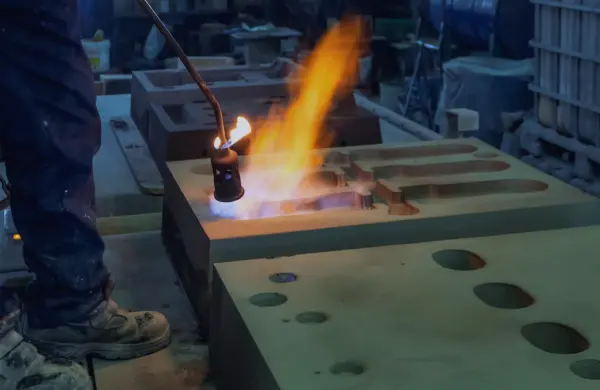Some Known Incorrect Statements About Alcast Company
Some Known Incorrect Statements About Alcast Company
Blog Article
The Ultimate Guide To Alcast Company
Table of ContentsThe Ultimate Guide To Alcast CompanyThe Of Alcast Company5 Easy Facts About Alcast Company DescribedMore About Alcast CompanyFascination About Alcast CompanyA Biased View of Alcast Company
Chemical Comparison of Cast Light weight aluminum Alloys Silicon advertises castability by reducing the alloy's melting temperature and enhancing fluidness during spreading. Furthermore, silicon adds to the alloy's stamina and put on resistance, making it beneficial in applications where resilience is vital, such as vehicle components and engine parts.It likewise enhances the machinability of the alloy, making it easier to refine right into completed items. In this method, iron contributes to the overall workability of light weight aluminum alloys.
Manganese adds to the strength of light weight aluminum alloys and enhances workability (aluminum metal casting). It is generally utilized in wrought light weight aluminum items like sheets, extrusions, and profiles. The presence of manganese aids in the alloy's formability and resistance to fracturing throughout construction processes. Magnesium is a lightweight aspect that gives stamina and impact resistance to light weight aluminum alloys.
Rumored Buzz on Alcast Company
It allows the production of lightweight elements with exceptional mechanical residential or commercial properties. Zinc boosts the castability of light weight aluminum alloys and helps control the solidification process during spreading. It boosts the alloy's strength and hardness. It is typically found in applications where detailed shapes and fine information are essential, such as attractive castings and particular automobile parts.

The primary thermal conductivity, tensile stamina, yield stamina, and prolongation vary. Amongst the above alloys, A356 has the highest possible thermal conductivity, and A380 and ADC12 have the lowest.
Alcast Company Fundamentals Explained

In precision casting, 6063 is appropriate for applications where intricate geometries and top notch surface finishes are extremely important. Examples include telecommunication rooms, where the alloy's premium formability permits sleek and visually pleasing layouts while maintaining structural stability. In the Lighting Solutions industry, precision-cast 6063 elements develop elegant and effective illumination components that call for detailed shapes and good thermal performance.
It brings about a better surface area finish and better rust resistance in A360. The A360 displays remarkable elongation, making it optimal for complicated and thin-walled elements. In precision casting applications, A360 is well-suited for sectors such as Customer Electronic Devices, Telecommunication, and Power Tools. Its improved fluidity enables intricate, high-precision parts like smart device coverings and interaction tool real estates.
How Alcast Company can Save You Time, Stress, and Money.
Its distinct residential or commercial properties make A360 a beneficial choice for accuracy spreading in these industries, improving item resilience and high quality. Light weight aluminum alloy 380, or A380, is an extensively made use of casting alloy with a number of unique characteristics. It uses excellent castability, making it a suitable selection for precision casting. A380 displays great fluidness when molten, ensuring elaborate and in-depth mold and mildews are properly replicated.
In precision spreading, light weight aluminum 413 radiates in the Consumer Electronics and Power Devices sectors. This alloy's remarkable rust resistance makes it an exceptional selection for outside straight from the source applications, making sure long-lasting, resilient products in the mentioned sectors.
Not known Facts About Alcast Company
Once you have determined that the aluminum die casting process is ideal for your task, a vital next step is selecting the most suitable alloy. The aluminum alloy you choose will significantly affect both the casting procedure and the properties of the end product. As a result of this, you have to make your decision meticulously and take an enlightened method.
Figuring out the most appropriate light weight aluminum alloy for your application will certainly imply weighing a wide array of qualities. These relative alloy characteristics adhere to the North American Die Casting Organization's standards, and we've divided them into two groups. The first group addresses alloy features that influence the manufacturing process. The 2nd covers qualities impacting the residential or commercial properties of the last item.
The Best Guide To Alcast Company
The alloy you pick for die casting directly influences several facets of the spreading process, like just how easy the alloy is to deal with and if it is prone to casting problems. Hot splitting, additionally understood as solidification splitting, is a typical die spreading issue for light weight aluminum alloys that can lead to inner or surface-level tears or splits.
Specific light weight aluminum alloys are a lot more vulnerable to hot fracturing than others, and your selection needs to consider this. It can harm both the cast and the die, so you should look for alloys with high anti-soldering properties.
Deterioration resistance, which is already a notable characteristic of aluminum, can vary significantly from alloy to alloy and is a crucial particular to take into consideration depending upon the environmental conditions your product will be subjected to (aluminum casting company). Use resistance is one more property commonly looked for in light weight aluminum items and can separate some alloys
Report this page